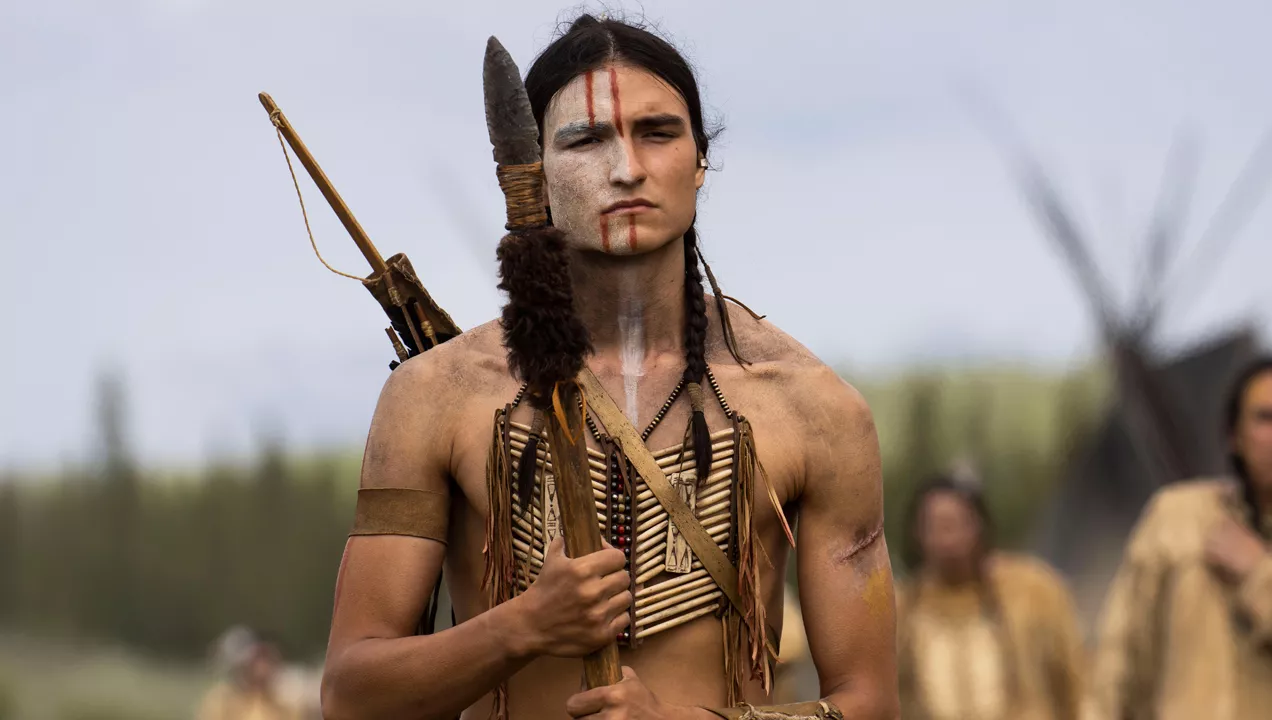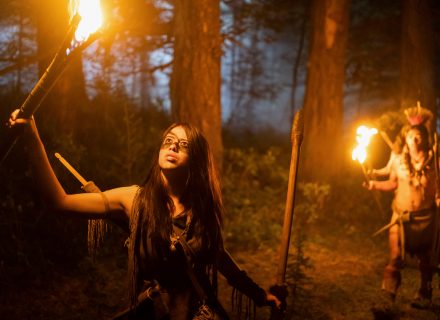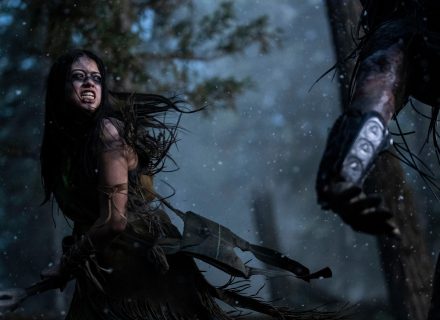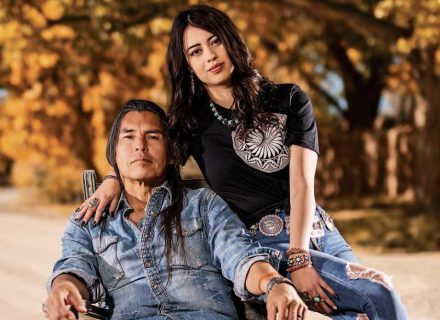Actor and country musician Dakota Beavers chats with C&I about singing, upbringing, and taking a big movie break in stride.
It could be the beginning of a long, beautiful legacy, but Dakota Beavers is still amazed that it happened in the first place. At age 22, having never acted in TV or film, the Arizona native landed his first movie role in a big-budget action sci-fi thriller – one that happened to also be imbued with cultural and historic perspective befitting any serious Oscar contender.
We’re talking about Hulu’s Prey, which stars Beavers and Amber Midthunder as Comanche siblings protecting their tribal family in the Northern Great Plains of 1719. It’s a prequel that, yes, culminates with an otherworldly battle against an extraterrestrial being.
But there’s much more heart and soul to the story of Midthunder’s Naru and Beavers’ Taabe, a brother and sister who both dream of becoming great tribal warriors and shielding their loved ones from harm. The two young leads carry the dreams and the will to survive, and they also accurately portray aspects of the Comanche culture authentically – something that was important and imperative for Prey producer and Comanche member Jhane Myers. (There’s even a Comanche-language dub of the movie available to stream, in addition to the English language version.)
When we caught up with Beavers last week, he was taking some time off in his New Mexico home and reflecting on his breakout year. What we’d recently discovered, of course, is that Beavers is no stranger to entertaining audiences. He’s a highly skilled singer and performer who fronts his family’s longtime country band, WesternBoy.
Grab some coffee and enjoy our extended conversation with the young actor and musician — you’ll be impressed by how grounded he is. Like we said: It's only the beginning.
C&I: We’re starting to look back on the pieces of entertainment that captured our imaginations this year, and Prey was one of the brightest. I was taken aback by how much more it was than a popcorn Predator movie. It had remarkable soul to it and thought behind it. I just wanted to see what your life has been like since then since it was your very first role.
Dakota Beavers: It was a really big switch for me. … For me, it was a massive difference or dichotomy [compared to] what I was doing before. I'd been living in Nashville for the last few years playing music and working at TJ Maxx during the day, working a regular job. We [our family’s country band, WesternBoy] were playing at this little marina during COVID, just trying to survive. And then I got an opportunity to do this audition through a series of just little crazy things that shouldn't have happened.
You’ve said you had auditioned for something else, and then [the Prey team] saw your audition tape?
Yeah, there was an open call on Instagram. There's this guy I follow up in Canada, and he just posted this open call, and I had always wanted to do acting. I just didn't know anybody in the business. And I didn't know how it worked, but I knew music. So I was like, “Maybe I'm a good enough musician, I'll be able to do that someday.” But I saw the open call and I said, “Hey Pops, you think I should send in my picture and my name?” I was like, “What would it hurt?” And he was like, “Yeah, man.” He goes, “Worst case, they just say no or they ignore you.” I was like, “All right.” And then they sent me an audition for a different show.” I'm guessing it was a smaller part, I don't really know. But that movie got canceled because of COVID.
Anyway, I was still in their system or their files … and a year later, they come back to me with the Taabe role. And I didn't know anything about it. The next thing you know, I'm number two on the call sheet [for Prey] and my dad, he was blown away. He's like, “There's 400 people on this call sheet and you're the number two on there.” Film is weird because it's this hierarchy of people, and then they're treating me like I'm fancy or something, and I'm not. I'm like, “Dude, I feel more in common with the grips than I do all these other fancy pants-es.”
But I have to say you made it look natural. When I saw the movie, I was like, “Why haven't I seen this guy in things before?” And I started looking and I'm like, “Wait a minute. This is his first thing.” Do you credit your confident performance partly to the environment of the film and the team making it?
Yeah. Luckily, all those years of playing music, you get numb to what people think sometimes when you're putting yourself out there, there's kind of this attitude when you're playing gigs and stuff like that. I know what I can do. I know what I'm good at. If they don't like it, on to the next one. And that's kind of what I went into the audition with. “I'm going to do my best. I know what I know how to do and my self-worth is not in what they say. I hope they like it. But if they don't, I'm going to be okay and I'm going to go on to the next one.”
That helps us think about your upbringing, in terms of how you quoted your dad while ago. He sounds like just a real laid-back, wise guy. Is that how you would characterize him?
Yeah. My family is a massive part of my life. My dad … I've often said he's my best friend. I don't have a whole lot of friends, but I consider my dad one of them, if not my best friend. And they're always there, they're always supportive. And I'm just so thankful because not everybody has that. I think about friends that I've had or even people that I worked with on the movie and they don't have dads. And I was blessed to have not only a good dad, but a good mother. And to me, it's better than winning the lottery.
And is that your brother in the band who's playing the mandolin?
Yep. He's my brother. He's a great guy, too. He's got a heart of gold. It's kind of neat. When you're all mixed up like we are, nobody looks like each other, so he just looks so different. And everybody's like, “He's your brother?” And I'm like, “Yeah, man.” But yeah, man, he slays that mando.
When did you realize that you could sing? I know every singer gets asked that, but were you singing along to something? When did you discover you had such a range?
Thank you. My pops, he kind of played solo music around Arizona and he did it as a teenager as well. He was in a band and they toured across the country a little bit. So I grew up watching my dad play, and I love music. When certain songs would come on the radio, I'd really key in to some. But a lot of the earliest memories I had was just sitting there watching my dad play and watching my dad sing. So I would go to his gigs. I remember one night we were playing out, my dad likes to tell this story. But he was playing at this campsite kind of thing. He was playing a gig for a couple hours and me and my brother were sitting there at the picnic tables and we were just singing along, but we weren't really thinking about it.
But he was like, “They're singing harmony to my tunes, man.” He's like, “They're singing harmony with me.” And so then he kind of started bringing us up there. Not that particular night, but he was like, “Let's learn a song.” And so I'd play the guitar and he'd play the bass and throw my brother on mando. And he's like, “All right, you sing this part.” And so it kind of began from there and we just started playing out. Then my brother and I got a job on this train called the Grand Canyon Railway, and we dressed up like the 1800s. I was 13 when I got that job. My dad kind of hooked me and my brother up, and I played all throughout high school for four years on that train. So that was another performing experience, because you're literally right in front of people's faces and if you suck, they're going to let you know.
And they're sort of a captive audience, not necessarily paying to see you. So dealing with that level of self doubt, rejection or just a face can throw you off. That had to have helped you going on a film set that is a totally foreign experience. Did performing music make you think, “I can do this. I have a thick skin. I can get up there and I can play a different character and get outside of myself”?
Yeah. I was kind of a mockingbird growing up. People and characters always fascinated me whether it was a musical character, or their voice was just different. If I was trying to sound like Willie Nelson just for fun, or if I was like, “I'm going to sound like Merle Haggard.”
“I'm going to make myself sound like Merle Haggard or Marty Robbins.” They have such distinctive voices. I was drawn to voice. And then we went and watched a lot of old movies. We watch John Wayne, we watched Fort Apache or Rio Grande or Rio Bravo, or even movies like Casablanca. I would like to emulate these voices or these characters, and it was fascinating to me. Tombstone is a great example.
Oh my god, yeah. The voices in that movie!
Yeah. Distinctive characters. The cast in that movie was stacked, and nobody is the same. I always wanted that to be a part of me, whether it was music or acting. I would say that the common denominator was voice, whether they were speaking or singing.
You found colors to your voice. I love the way you can go down to that deep baritone like a classic country singer, but then a couple minutes later you're up in the soul register. And making those work together is something maybe the genre might need more of right now. Are you looking at a music career simultaneously with your movie career?
That's something I definitely strive and hope for and will definitely try to work for. Obviously when the right opportunities come my way, I try to go with those opportunities. But making music as in recording music doesn't take as long as recording a movie. So you can do them both. And now, you don't have to go on a six-month tour. You can shoot a movie for six months and then, “Oh, I got gig in Albuquerque. I got a gig in Phoenix. Oh, there's a really good show I want to play in Nashville.” You can pick and choose the times when you're open now because of streaming, because of YouTube. But playing music is definitely something on the list. We have a lot of original music that I think is really good and that's ready to be recorded. It's just kind of a matter of finding the right people that we want to record with and getting the funds together, and then getting it out there in a way that I think people would enjoy and that we would feel good about.
Let's get back to Prey. It seemed as though the crew was just so thoughtful and reverent to the subject matter and to the characters and the Indigenous cultures they were portraying. What was the orientation, or the first kind of shot at figuring out how it was going to go, when you got to set?
Everybody was so warm for the most part on the film. One thing I really noticed first off was how laid back [director] Dan [Trachtenberg] was because you see these videos and B rolls of these directors on doing their thing. And as a first time actor, that could have been intimidating, and it could have been a lot for me to take. But Dan, he really was respectful to the culture that he was portraying with [producer and Comanche Nation member] Jhane [Myers] right there, letting her do whatever she wanted to do, but also [was respectful] to me. If I had an idea, he would listen.
I was 22 when I [did] the job, and if I had an idea he would listen and he would let me do it. And some of those things are in the movie that would not have been there if he didn't let me talk or didn't let me run an idea by him. With the [other] boys [in the cast of] the movie, we spent so much time together and a lot of them have more experience than me, but even still not much. And so we all got along splendidly, and we would go running around the woods and the town riding those stupid scooters you get the app to pay for.
And then Jhane herself, she's like part of my family. I call her paha, which means “auntie” in Comanche. And she lives five minutes from me. I just talked to her this morning.
Do you have more movie and acting plans lined up now?
Yeah! Nothing that is really solid enough for me to talk about yet ... I actually just did an in-person audition today. I came from that to this. That could potentially be something interesting that I think people might like. But I think after the movie, when you don't have any experience and you don't have any tape of you actually acting, I think it's hard to get people to believe that you actually do this.
They're like, “Do you have head shots?” And you're like, “I have Hulu. Go to Hulu and watch Prey.”
Yeah, yeah. [Laughs.] I still don't have headshots. But yeah. After [finishing] the movie, I was like, “I'm in a movie, man. I swear!” Then it finally came out and people were like, “Oh, maybe this kid can act.”
When you read the Taabe character for the first time, in what ways did you identify with him? Because it's a very physically demanding role as well. Did you feel prepared to do all the things that required?
Physical-wise, I was worried because I got a call from the stunt coordinator and he's like this drill sergeant kind of guy. And he was like, “We're going to kick your butt when you get up here and we're going to work you out.” And I was like, “Oh, snap.” And I wasn't sure stamina-wise or cardio-wise if I was going to [make it] ... because he was talking about lots of running. So I just started killing myself. I had a month or something before I was going to Canada to start filming, so I would just be running to the point of [feeling] like I was going to pass out. Because I was like, “I need to be this skinny, sinewy guy from the 1700s who can do this all day long.” And so I really killed myself. But luckily when I got there it wasn't as bad as I thought. And then the stuff that they had me doing, I was like, “Thank goodness; I thought this was going to be worse”

You had gotten used to playing these marathon sets in Nashville and I've seen those kinds of sets. They take a little break, but they play requests, they play every song they can think of. That has to be a test of your endurance and your stamina as a performer.
We used to play at the marina [in Nashville]. It was a great gig. A wonderful lady owned that place and she kind of helped us survive by letting us play at this place. But sometimes [the temperature] would be in the 90s, and it's a hundred percent humidity, and you're right on the river. And think of playing and talking for four hours nonstop. You're the only singer of the group and you're singing hard. It's not like I'm singing Don Williams all night. It's exhausting. And then you’ve got to haul your gear home and then you got to do a shift at TJ Maxx the next day. So when I got to the Prey set, sometimes you do 17 hour days, sometimes you do 18 hour days. You’ve got the ladies coming and draping the coats over your back, you’ve got to them bringing you drinks and snacks, and they give you a trailer. And you hear some people complaining. I'm like, “Dude, this ain't no TJ Maxx, man.”
Did you work the floor at TJ Maxx, or were you on register?
I did the register a lot. Which, thankfully, looking back, it was the best lesson on doing interviews and also being in front of people all day long because … think about it. You get there and if it's busy, you're talking eight hours nonstop. And so for me, it was perfect training for this job.
I used to get so frustrated sometimes. When you're a young guy and you have all this desire to go out and do what you feel like you've been made to do, but you're working a regular job and you feel like you're spinning your wheels, you get frustrated sometimes. But I got to a point where I was like, “You know what? If I'm supposed to be here today, I want to do the best that I can. I want to bring some light into somebody's life today.” And so I was like, “I'm going to do my best, man.” And after just being happy, smiling, asking people about their day, man, you get old ladies who bring you cookies, they'd be bringing you tacos and cheese dip. And oh man, these ladies would come in and just say, “Thank you, you made my day. I just wanted to give you something.” And it really was a neat experience in the end and I'm thankful for all those years grinding.
A lot of the greatest artists sometimes have to work these day jobs to draw their inspiration out. If you just have an easy life where you're only thinking about your project, where is the conflict going to come from? Where is the inner turmoil?
Yeah. Having a lot of years of, “Man, this sucks,” really, really helps you when you're in those moments on set or even singing a song where you just feel like you want to scream out this seven years of garbage that you have in your heart and in your mind. And you're like, “This is the place to do it, man. This is the moment. This is the time where I can express something that kind of makes you feel a little better.”
Before I let you go, tell me how you’re spending your time on break before getting back to the grind.
I've just been trying to enjoy the times that I have and not trying to fight the flow. I spend a lot of time outside. In the summer, I got a Triumph [motorcycle]. I go riding through the desert or up the mountain. I like to go out to the mountains or the desert and I just sit, and I like to take in the view, take in the silence because in the past, I've experienced that all of a sudden sometimes stuff rolls up on you and you're busy and you wish for times like that. And so, I just try to make sure I'm right in my heart, my mind, and my spirit, and just be ready for whatever comes next, whatever that is. So I'm just enjoying it, man.
Stream Prey on Hulu and follow WesternBoy's music via their YouTube channel.

















